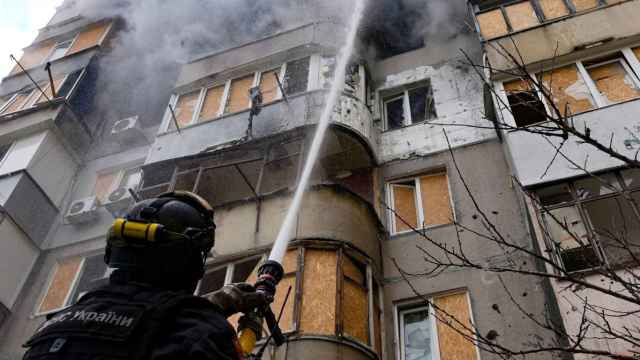KIEV — Jailed former Prime Minister Yulia Tymoshenko will be allowed to leave prison to be treated for a back condition at a Ukrainian hospital, prosecutors said Monday as the government appeared to bow to Western pressure.
German doctors who examined her last month concluded that she suffers from intense pain and needs urgent treatment in a specialized clinic. Tymoshenko's family said she suffers from a herniated disc.
Prosecutors' spokesman Yuri Boichenko said Monday that Tymoshenko will be treated at a specialized medical clinic in the eastern city of Kharkiv, where she is imprisoned.
The statement came days after the German government offered to treat Tymoshenko in Germany and said it was in talks with Ukrainian authorities on making that possible. The European Court of Human Rights asked the Ukrainian government last month to ensure that Tymoshenko gets specialized medical treatment outside prison.
Tymoshenko's lawyer, Serhiy Vlasenko, reacted with skepticism, insisting that the clinic should be determined by the German doctors who diagnosed her and prescribed her treatment. He said Tymoshenko will agree to being treated at a Ukrainian clinic only if that treatment is approved by the German doctors and is conducted by independent Ukrainian doctors.
"How can you trust a system that for half a year has been saying she is healthy?" Vlasenko said. "What kind of clinic will they choose? It makes no sense."
On Friday, Ukraine and the EU took a first step toward the former Soviet country's gradual integration into the bloc, but EU officials said an accord is unlikely until Tymoshenko's case is resolved.
The 51-year-old opposition leader is serving a seven-year sentence after being convicted in October of abusing her office while negotiating a natural gas supply contract with Russia in 2009. The case has strained Ukraine's ties with the West, which condemned it as politically motivated.
A Message from The Moscow Times:
Dear readers,
We are facing unprecedented challenges. Russia's Prosecutor General's Office has designated The Moscow Times as an "undesirable" organization, criminalizing our work and putting our staff at risk of prosecution. This follows our earlier unjust labeling as a "foreign agent."
These actions are direct attempts to silence independent journalism in Russia. The authorities claim our work "discredits the decisions of the Russian leadership." We see things differently: we strive to provide accurate, unbiased reporting on Russia.
We, the journalists of The Moscow Times, refuse to be silenced. But to continue our work, we need your help.
Your support, no matter how small, makes a world of difference. If you can, please support us monthly starting from just $2. It's quick to set up, and every contribution makes a significant impact.
By supporting The Moscow Times, you're defending open, independent journalism in the face of repression. Thank you for standing with us.
Remind me later.





